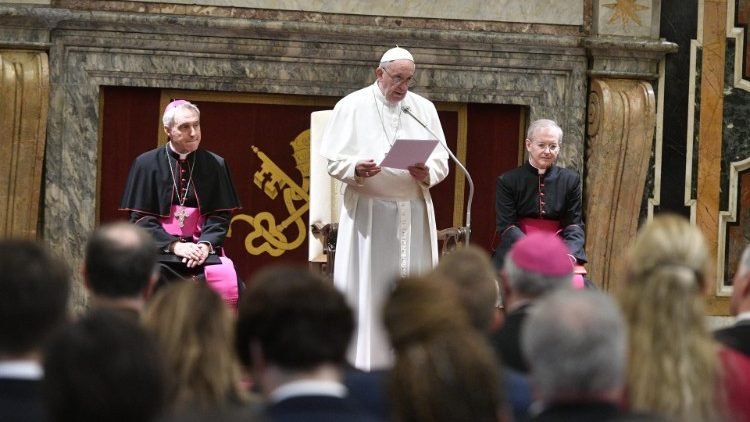Pope Francis meets in Audience with participants at the meeting on the “Common Good in the Digital Age”, promoted by the Pontifical Council for Culture and the Dicastery for Promoting Integral Human Development.
By Vatican News
When Cardinal Ravasi addressed the Pope at the beginning of the Audience, he said it was the complexity of ongoing scientific research in the field of digital culture that had inspired the two Vatican Dicasteries to “join forces”.
From AI to Transhumanism
The Cardinal listed some of the issues discussed during their meeting: from digital systems to autonomous weaponry, from artificial intelligence to blockchain, from robotization to transhumanism. The “guiding star” of their reflections, he said, remained the “value of the common good and the protection of the dignity of the human person”.
Pope Francis responded by acknowledging “the remarkable developments in the field of technology, in particular those dealing with artificial intelligence”, and how these “raise increasingly significant implications in all areas of human activity”.
Technology and ethics
Referencing his Encyclical Letter, Laudato Si’, the Pope said “the indisputable benefit that humanity will be able to draw from technological progress depends on the degree to which the new possibilities at our disposal are employed in an ethical manner”
He spoke of a “technocratic paradigm” that promises the imposition of uncontrolled and unlimited progress that endangers the whole of humanity. Instead, the Pope encouraged concretely fostering “the culture of encounter and interdisciplinary dialogue”.
The common good
Pope Francis praised the “inclusive and fruitful dialogue” that characterized the meeting, and that “helps everyone to learn from one another and does not allow anyone to close themselves off in prearranged methodologies”.
Commenting on the objectives of the meeting itself, the Pope recognized the challenge of precisely stating “both theoretical and practical moral principles” so that “the ethical challenges examined may be addressed precisely in the context of the common good”.
Robotics
Pope Francis spoke specifically about the positive and negative roles of robots in the workplace: on the one hand, undertaking “arduous and repetitive types of work”, on the other, depriving “thousands of people of work, putting their dignity at risk”.
Artificial intelligence
The Pope also addressed the issue of artificial intelligence. While allowing “greater access to reliable information”, AI can also circulate “tendentious opinions and false data” that can “manipulate the opinions of millions of people, to the point of endangering the very institutions that guarantee peaceful civil coexistence”, he said.
The good of the individual
Pope Francis added a warning: “If so-called technological progress were to become an enemy of the common good”, he said, “this would lead to an unfortunate regression, to a form of barbarism dictated by the law of the strongest”. “The common good cannot be separated from the specific good of each individual”.
A better world
The Pope concluded by affirming that “a better world is possible thanks to technological progress, if this is accompanied by an ethic inspired by a vision of the common good, an ethic of freedom, responsibility and fraternity, capable of fostering the full development of people in relation to others and to the whole of creation”.



